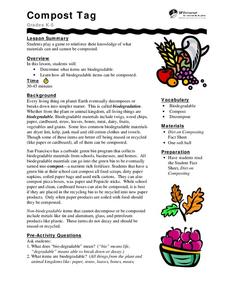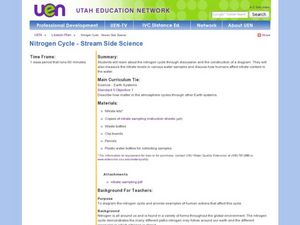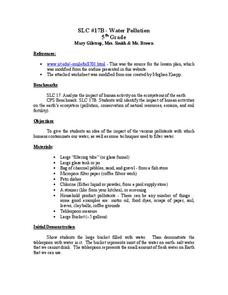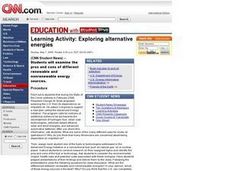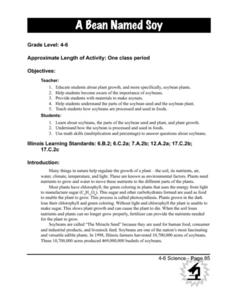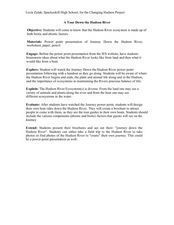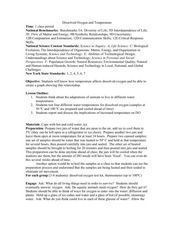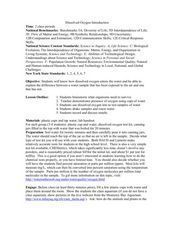Curated OER
Paleoclimate of the Hudson Valley
Students recognize how the climate of the Hudson Valley has changed since the last glaciation and be able to explain these changes. They reconstruct the paleoclimate of the Hudson Valley.
SF Environment
Compost Tag
Composting is a great way to get children involved in recycling. First, they discuss how biodegradable products decompose to make compost. Then, they talk about what can and cannot be composted. They play a game similar to around the...
Curated OER
Prairie Scavenger Hunt
Middle schoolers take a close look at the prairie environment. They identify common plants and animals of the prairie. In addition, pupils work in teams in order to put together a presentation on a certain aspect of the prairie...
Curated OER
Growing Vegetable Soup
Students use children's literature in order to think about the concept of creating a garden. This is done through conducting simple research about types of plants that could be grown in the area and how to care for them. Then the garden...
Curated OER
Wisconsin Agriculture; Berry Bunch's Cherry Fast Facts
Young scholars explore agriculture by researching Wisconsin's economy. In this cherry industry lesson, students read assigned text about the amount of cherries Wisconsin produces annually and the revenue it brings in to the state. Young...
Curated OER
Nitrogen Cycle-Stream Side Science
A thorough background and nitrate sampling lab sheet are provided to share with your young scientists. After discussing the nitrogen cycle with the class, you will break them into small groups and show them how to use their inquiry...
Florida Department of Environmental Protection
Build Your Own Aquifer
Ever wondered how an aquifer works? Introduce your class to the amazing way many people get water by exploring how underground aquifers work. Two fun hands-on activities are used to help kids understand what an aquifer is, how it works,...
Agriculture in the Classroom
Pumpkins... Not Just For Halloween
Celebrate fall with four pumpkin themed hands-on activities! After learning about pumpkins, scholars complete two activity sheets that reinforce estimation and word problems. They then plant pumpkin seeds and bake a pie in a bag.
Virginia Department of Education
A-Mazing Plants
Have your young scientists questioned why plants grow a particular way? Through this learning opportunity, scientists gain firsthand knowledge about how plants develop and various factors that affect rates of growth as they bring plants...
Curated OER
THE FARMER CARES FOR THE LAND
Young scholars will identify cause and effect relationships in issues relating to Agriculture and the environment.Ask students to describe what farmers do. Then ask young scholars to define the word "environmentalist." Ask students if...
Curated OER
Renewable vs. Non-Renewable Resources
Fifth graders, after brainstorming why conservation of resources is important, distinguish between renewable and non-renewable resources. They make a list of different types of natural resources on the board and then sort them into two...
Curated OER
Carnivorous Plants
Pupils examine how carnivorous plants get their nutrients from animals. In this food web lesson students examine how the plants attract their prey and are given many onilne sources to research.
Curated OER
Renewable vs. Non-Renewable Resources
Fifth graders identify renewable vs. non-renewable resources and comprehend why conservation of resources is important. They are asked what they think the words natural and resource mean. Pupils then put the words together to define...
Curated OER
Water Pollution
Fifth graders investigate how humans pollute the water supply with a number of different contaminates. While working in small groups they examine screening, sedimentation, filtration, and chemical treatments as methods of water treatment.
Curated OER
Water Pollution
Fifth graders observe and record what happens when household products are added to a tank of water to depict water pollution. They brainstorm ideas of how to clean the contaminate out of the water before watching demonstrations of...
Curated OER
Exploring Alternative Energies
Students research various forms of alternative energy sources and examine the pros and cons of each type. They discuss American oil dependence and the Bush administration's policies regarding this issue.
Curated OER
Let Us Grow Lettuce!
Students identify the stages of plant growth. In this plant instructional activity, students plant lettuce seed and take photos of the growth throughout a two week period.
Curated OER
Organic Farming / Agriculture
Want an organic farming resource packed with experiments, background information, science fair projects, and topics of interest for further research? Here it is. Young environmental scientists can explore concepts involved in organic...
Curated OER
Toward a Sustainable Agriculture
Read about sustainable agriculture and complete related Internet activities. After reading background information about the economics of sustainable agriculture and the problems with the industrial food system, your students click on...
Curated OER
Soybeans: The Miracle Seed
Students discover why soybeans are called the "miracle seeds." They make their own soynuts and share other foods made from soybeans. They create a bulletin board of soybean products.
Curated OER
A Tour Down the Hudson River
Students discuss how the Hudson River is an ecosystem made up of both biotic and abiotic factors. They view the PowerPoint the Journal Down the Hudson River. Students become aware of where the Hudson River begins and ends, the plant and...
Curated OER
Dissolved Oxygen and Temperature
Young scholars are shown how temperature affects dissolved oxygen and they create a graph showing this relationship. They think about the adaptations of animals to live in different water temperatures. Students test four different water...
Curated OER
Dissolved Oxygen Introduction
Students are shown how dissolved oxygen enters the water. They are taught the difference between a water sample that has been exposed to the air and one that has not. Students brainstorm what organisms need to survive. They use dissolved...
Curated OER
Is Our Water Healthy?
Learners test water for a least one chemical characteristic. They hypothesize how a storm event might change the chemical characteristics of a stream. Students collect water samples and use the chemical test to test the water.



